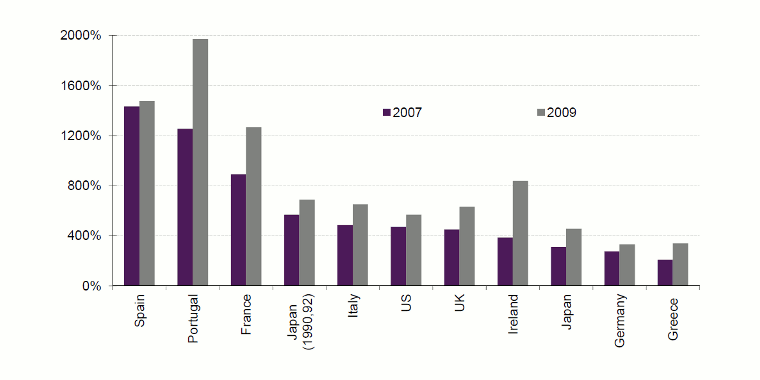Non-financials' net debt to earnings (EBIT) ratio by country
Of course, from an Icelandic perspective, this isn't that interesting until we put the Icelandic data in there as well. And since the Central Bank of Iceland only just yesterday - what are the odds! - posted, for the first time, aggregated financial accounts for households and firms in Iceland, we can construct the same data.
Icelandic firms' net financial debt to earnings (EBIT). Net financial debt is estimated with Gross Debt - Total Deposits.
Here is also another graph showing the other side of non-financial debt, i.e. household debt. All three countries experienced the same: a massive private debt bubble!
Household debt as % of GDP
So the difference isn't that great between Spain, Portugal and Iceland. We're all fighting a private debt crisis. The public debt crisis is then bred by the private debt crisis: too much private debt is stopping private investors from getting investment and spending started again, leaving the States stripped of tax income from private economic activity.
Due to this, the public debt crisis is perhaps more severe in Portugal and Iceland since private parties are more indebted in those countries compared to Spain. Also, the State is more indebted in Portugal and Iceland as well (public debt closing onto 90% of GDP in both countries while around 60% in Spain).
But the foundations of the debt crises in Spain, Portugal and Iceland is private debt. In Greece and Italy, it's arguably public debt however. But no matter where the fundamental problem is, while the debt levels remain high in those economies, economic activity will be low. And while economic activity will be low, the public and private debt crises will just keep on growing, especially if nominal economic growth won't be higher than the interest rate on the debts of public and private parties.
Spanish, Portuguese and Icelandic private and public parties need to deleverage their balance sheets, just as private parties had to in Japan during the 90s after the "Swinging 80s" in Japanese stocks and houses. That deleveraging rushed in the Lost Decade: a decade of weak economic growth, low or negative inflation, ultra-low interest rates and high unemployment compared to the years before.
It is not unlikely that some sort of similar economic hardship will hit the three economies here discussed. And when Spain and Portugal end up in such situation, they will drag the rest of the euro zone down with them. Christine Lagarde is probably right: there is a serious threat of an European Lost Decade.



No comments:
Post a Comment